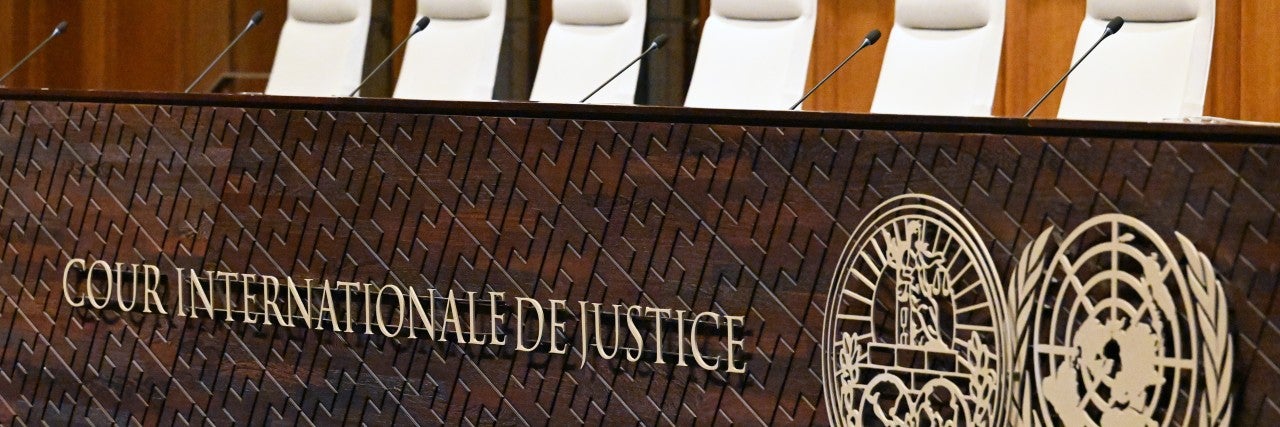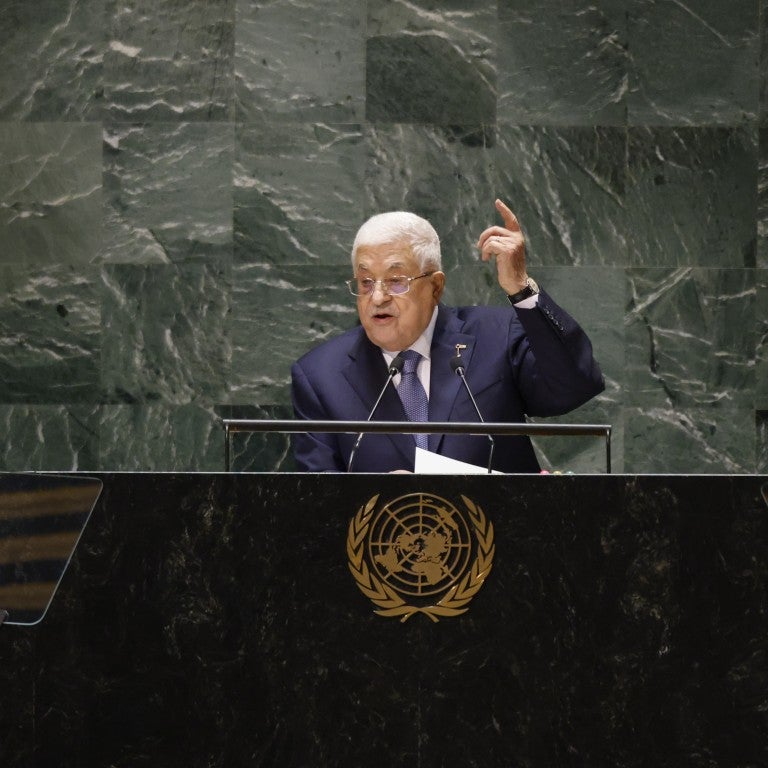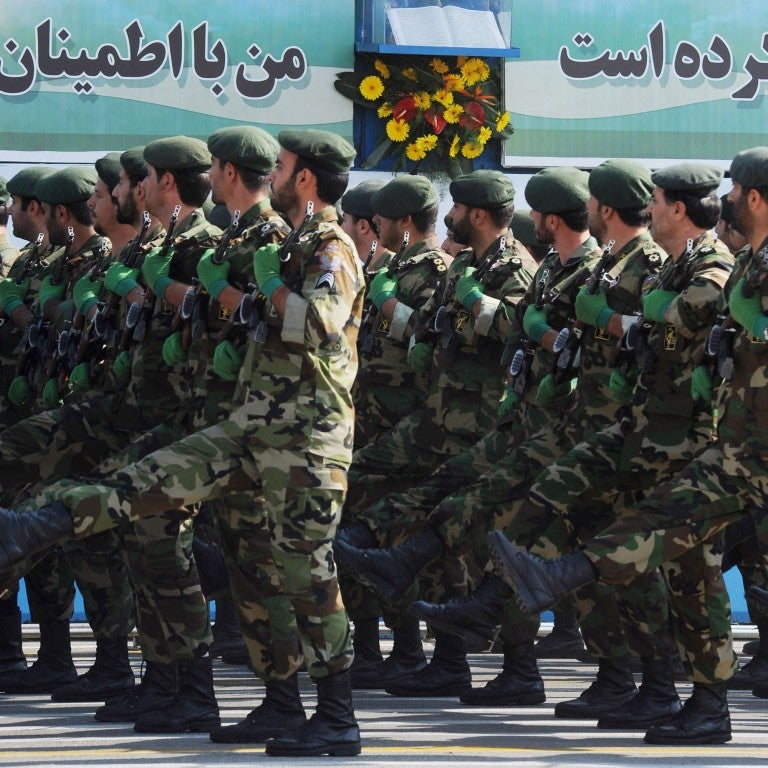January 11, 2024
Update: On January 26, the International Court of Justice issued a provisional ruling on this case, declining to order Israel to cease its defensive military operation against the Hamas terror group. This decision dealt a major blow to South Africa's outrageous and meritless case. Learn more here.
The International Court of Justice is currently hearing South Africa's case accusing Israel of genocide in Gaza. Professor Geoffrey Corn from Texas Tech University joins us to explain how we got here, the case’s significance, and why the claims of genocide are baseless.
*The views and opinions expressed by guests do not necessarily reflect the views or position of AJC.
Episode Lineup:
- (0:40) Geoffrey Corn
Show Notes:
Explainer: What You Need to Know about South Africa’s Baseless Genocide Accusation Against Israel
Go Deeper: 5 Reasons Why the Events in Gaza Are Not “Genocide”
Listen – People of the Pod on the Israel-Hamas War:
- Countering the Denial and Distortion of the 10/7 Hamas Attack
- 4-Year-Old Hostage Abigail Idan is Free–Her Family is On a Mission to #BringThemAllHome
- What Happens Next: AJC’s Avital Leibovich on the Hostage Deal and Challenges Ahead
- What Would You Do If Your Son Was Kidnapped by Hamas?
Follow People of the Pod on your favorite podcast app, and learn more at AJC.org/PeopleofthePod
You can reach us at: peopleofthepod@ajc.org
If you’ve appreciated this episode, please be sure to tell your friends, and rate and review us on Apple Podcasts.
Transcript of Interview with Geoffrey Corn:
Manya Brachear Pashman:
The International Court of Justice is holding its first hearings in a case filed by South Africa, accusing Israel of committing genocide against Palestinians in Gaza. While it could take years for the panel of judges to rule on the genocide accusation, South Africa has asked the judges to issue a restraining order of sorts in the coming weeks that could among other things, call on Israel to halt its effort to root out Hamas and bring home the remaining hostages, at least until a verdict is reached. Here to explain what's at stake and the questions that the court will need to weigh is Professor Geoffrey Corn, Director of the Center for Military Law and Policy at Texas Tech University. Professor Corn. Welcome to People of the Pod.
Geoffrey Corn:
Thank you for having me.
Manya Brachear Pashman:
So you are an expert in international humanitarian law and the law of war, which to some those terms might seem contradictory, or are the? Are they actually one in the same?
Geoffrey Corn:
No, they refer to the identical branch of international law, historically, we call this branch of law, the laws and customs of war. Before the end of World War II, it was referred to as the law of war. And then, of course, with the advent of the United Nations Charter, technically war was prohibited. And states engaged in armed conflicts.
And so the name evolved for many years to be referred to as the law of armed conflict, the LOAC, that's still what it's called. And in official US circles, we have the Department of Defense law of war manual, and the army law of armed conflict manual, most of the world today refers to it as international humanitarian law. And that, as you know, it can be misleading because it suggests that it's really focused on human rights. In fact, IHL, or international humanitarian law is a synonym for the law of armed conflict. It's the law that regulates the conduct of hostilities, during conflicts between states or between states and non-state groups, and protects victims of war.
Manya Brachear Pashman:
So let's cover another basic distinction or definition that will help listeners decipher all of this, the charges that I spoke of in the introduction, they had been brought in the International Court of Justice. And now that's the 15 judge panel of the United Nations.
Not the International Criminal Court, which is also in The Hague, but charges individuals with war crimes. So can you explain for our audience the purpose of the International Court of Justice?
Geoffrey Corn:
Sure, the International Court of Justice is part of the mosaic of the Charter of the United Nations, a treaty that was created in the aftermath of World War II, to manifest the international community's determination that wars not be the mechanism by which states resolve their disputes. So there are a variety of mechanisms built into the Charter of the United Nations, the one people are most familiar with is the Security Council, which is vested by the treaty with enforcement power.
So the Security Council has the authority to authorize measures for the restoration of international peace and security. So for example, in 1991, when the coalition conducted military action against Iraq to force it out of Kuwait, that was done under the authority of the Charter of the United Nations and the Security Council resolution to restore international peace and security.
One of the four components of the United Nations is the International Court of Justice. It is a successor to a prior international court that sat in the Hague, and its singular jurisdiction is over disputes between states, or to give advisory opinions on international law as requested by the Security Council or the General Assembly. But the primary function of the International Court of Justice is to serve almost like an arbitration mechanism when states have disputes so that they can resolve them in accordance with international law without resorting to force to resolve those disputes. And so it has no jurisdiction over individuals.
It is, as you know, very different from the International Criminal Court, which is a treaty based criminal tribunal, and its jurisdiction is dependent on whether or not the individual is a national of one of the treaty parties, or whether the alleged crimes occurred in the territory of one of the treaty parties is Israel is not a party to that treaty, nor is the United States. But Palestine is. They've accepted Palestine as a member of the court, which means the prosecutor for the international criminal court has jurisdiction to investigate and pursue charges for any alleged war crimes that he believes have occurred in Palestinian territory, which includes Gaza. So two very different courts, very different consequences for their assertion of jurisdiction.
Manya Brachear Pashman:
So now, both Israel and South Africa are signatories of the 1948 Genocide Convention. That is precisely why these charges have been brought to the ICJ right. It's because they are both signatories of that treaty.
Geoffrey Corn:
Yeah, so I wouldn't say charges, I would say accusation. Right, because when we say charge, we tend to think of a criminal accusation.
Let's remember that an accusation is just that. It's not proof, it doesn't prove anything. If you read the filing by South Africa, it really is an exercise in selective fact assertion and ignoring inconvenient facts, there's a lot more to this story that we're going to see when we see the Israeli filing in response.
So the Genocide Convention says, if there's a dispute between signatories or contracting parties to the treaty, they agree to allow the International Court of Justice to resolve that dispute. So one of the aspects of South Africa's filing is that they alleged that they've made a number of diplomatic forays to Israel demanding that they explain how what they're doing is legal and asserting that it's genocide. And Israel has not responded to those diplomatic forays, and therefore, that's created a dispute within the meaning of the treaty. And one of the things the court is going to have to resolve is whether there is in fact, a dispute between two members of the treaty as a jurisdictional predicate to even reaching the question of whether they should impose preliminary measures.
Manya Brachear Pashman:
And is that does that precede the ruling on provisional measures?
Geoffrey Corn:
It will be it will be part of the ruling. In any in any court of law, there's always a question of jurisdiction. Now, in most cases, it's not complicated. If you commit a crime where you live, the state has jurisdiction over that crime, but in the international realm, it's often a matter of debate as to whether or not the tribunal that has been requested to adjudicate an issue is actually vested under the law with the power, that's what jurisdiction means the power to resolve that issue. So the first issue that the court’s going to have to resolve is whether it in fact, has jurisdiction pursuant to the terms of the Genocide Convention. And then if it says it does, then it will go to the question of whether there is a compelling case for preliminary measures.
Manya Brachear Pashman:
So we know South Africa has a history of anti-Israel positions, it has historically sided with the PLO, Palestinian Liberation Organization and it now appears to be supporting the Hamas terrorists that govern Gaza. There also might be some political posturing going on here ahead of a national election. But how did we get here? A genocide claim against the Jewish state.
Geoffrey Corn:
I think the answer to that is twofold. I mean, the first is that there is a widespread public perception that the level of carnage being inflicted as a result of Israeli Defense Force operations in Gaza is intolerable. And it's created a perception among many that the Israelis are actually not just trying to defeat Hamas’ military capability–they are trying to destroy in part the Palestinian population of Gaza, that that's their intent.
Now, I personally believe that that is a highly erroneous inference to draw from the facts on the ground. But this is part of Hamas’ information campaign. This should be unsurprising from the inception of this conflict, they know that they cannot defeat Israel in battle.
And this is one of the ironies of Israel's military struggle against Hamas. And I would say even if it occurs, Hezbollah. These highly capable organized military groups are under no delusion that they have the capability to confront the Israeli Defense Force and defeat it on the battlefield. For them, combat is not about defeating your enemy.
For them combat serves their information campaign. They use combat to create conditions to advance their strategic information campaign of delegitimizing Israel, but more importantly, in creating pressure both within Israel and externally to force Israel to terminate its operations before it achieves its combat objectives, which are much more traditional, which is to defeat your enemy on the battlefield.
So if you think about it, for Israel, what does operational success look like? It looks like Hamas’ military capability has been completely destroyed. The word destroy is a military doctrinal term, and it means that you are combat and effective without substantial reconstitution. What is Hamas’ is operational objective? It’s to be there when the proverbial and literal dust settles.
And that means they've got to do something that compels Israel to stop before it achieves its military objective of destroying Hamas. They can’t do that by force. They can only do that by getting the international community to pressure Israel to terminate its operations before they've achieved these objectives. And the best ammunition Hamas has to do that is creating the reality and the perception of the indifference to the human suffering that's occurring in Gaza.
So this is all connected to a strategic objective of Hamas. And that's why the most prominent statistic that we hear day in and day out is what? The civilian death toll in Gaza, which ironically, never apparently includes an enemy combatant. I guess the IDF is fighting shadows, because apparently they're not killing any enemy, because every casualty is asserted to be a civilian.
And I don't want to, in any way, minimize the tragedy of human loss and war. But you cannot find an enemy that's determined to create conditions where you have to inflict civilian casualties without doing so. And that's the strategy from inception that has snowballed into a public perception that Israel's objective is much more nefarious than simply defeating Hamas. That's one factor. The other factor to be to be candid, is the terribly bombastic statements of certain Israeli government officials that fuel this perception that you have an ulterior motive here that's separate from just achieving a legitimate military goal, and the failure of the Netanyahu administration to be more aggressive in sanctioning or isolating the officials in the government who make those foolish statements.
Manya Brachear Pashman:
To be fair, I should note that Prime Minister Netanyahu did post a statement to social media after this interview was recorded in which he insisted that Israel has no intention of displacing the Palestinian population from Gaza and permanently occupying the Strip, despite those calls from some Israeli government officials.
Israel’s legal team is quite likely going to emphasize the extensive precautionary measures taken by the IDF to minimize civilian casualities and they will also quite likely emphasize the ongoing humanitarian relief being facilitated by Israel since mid-October – tens of thousands of tons of medical supplies, food, water, shelter equipment. Still, that doesn’t change the level of carnage you mentioned, which is incredibly disturbing for all of us.
You predicted early on that the notion of proportionality would become an issue. You predicted that back in October, regarding Israel's response, and I'm curious if you could kind of explain the notion of proportionality, the misconceptions about proportionality when it comes to warfare.
Geoffrey Corn:
So it's a critically important question, because if you read the 84-page submission by South Africa, they make what they allege to be the indiscriminate nature of Israeli military action, a centerpiece of their proof of genocide. o when we talk about proportionality in war, there are two different aspects of proportionality we have to understand.
The first relates to the right of the state to defend itself. And that really functions no differently than if you were walking down the street and somebody attacked you under the law of self defense. You are allowed to take self help measures to protect yourself, but those measures have to be proportional to the threat. It is a mistake to assume that that is only limited to tit for tat response. They fire a missile, you're allowed to fire a missile. If someone swung a punch at you on the street. The law doesn't say you're only allowed to swing one punch back and then wait for them to punch you again. You're allowed to take reasonable measures.
So if we think about Israel's action of self defense against Hamas, what do we know? We know Hamas represents an ongoing threat of significant military and terrorist violence against Israel. And the only way that Israel would be able to be confident that it’s restored its security, the security of its population, the security of its territory, would be to take military action to completely destroy Hamas’ military capability.
So the way that that self defense objective is translated into military terms, in the military as a whole, you need to do what is necessary to be able to come back to the political leadership and say, the people in southern Israel are safe again. And so the idea that Israel should just terminate operations and build a wall is unrealistic, because they tried that already. They've had more limited military action against Hamas in the past, and Hamas has demonstrated over and over again, an ability to bypass their defensive measures and inflict death and injury on Israelis.
Once you're fighting, there's another component of proportionality, which is the one that we're all focused on now. And that has to do with what we call the incidental or collateral consequences of attacking a legitimate target. So if I'm going to attack a building, because there's an enemy fighter in the building, and I know that in doing so, I cannot avoid killing civilians, I have to make a proportionality assessment under the law of armed conflict or international humanitarian law. For each individual attack, the commander has to make a judgment.
First, the commander has to assess the military value of attacking the target, then the commander has to assess the unavoidable civilian risks that will be created by conducting that attack. If the commander concludes that the risk, the harm to civilians would be excessive, compared to the concrete and direct military advantage, then the attack would be considered disproportionate and indiscriminate within the meaning of international law.
So if I were to put a question to your audience: you have an enemy commander, you identify him in a bunker, that's the enemy has put under a congregation of civilians deliberately, maybe the bunker is under a school. And he's a high-level enemy commander. And you've done everything you can to get civilians to evacuate. But you know that the only way you can kill that commander is to conduct an attack that will result in 20 civilian casualties.
If we took a poll right now, is 20 civilian casualties excessive in relation to the value of attacking that target–we’d probably have as many answers as we had participants. So the reality is that when we look at an aggregate number, even if we take Hamas as numbers at face value–23,000 civilians have been killed. And we say that proves all of the attacks were indiscriminate. It's a complete distortion of the process of analysis. Because you don't do an aggregate number, you look at the individual attack, you have to decide what was the value of the attack? What was the risk that was anticipated? What measures did the attacking side do to mitigate risks? What measures did the defending side do to exacerbate risk? And you put all that into the equation.
So there's been a complete distortion of the way this is actually supposed to function. And what we've created and what South Africa has done in its filing is it's created, almost a strict liability standard. If you kill X amount of civilians, your attack is indiscriminate and it violates the proportionality rule. I always ask a question in response, if you tell me that killing 100 civilians as a consequence of killing a high level enemy commander is too much. How many are okay? Can you give me a number? Is 50 okay, 20,10. There's no book. There's no manual, there's no equation.
And that's why my view from inception has been the much better mechanism for mitigating civilian risks are the steps you take before the attack to reduce that risk. And when we look at that, we see no moral equivalency because you have the Israelis trying to figure out ways to reduce civilian risk, and we have Hamas deliberately engaging in conduct that exacerbates civilian risks.
Manya Brachear Pashman:
There’s been a longstanding concern that in the United Nations, Israel faces a double standard. Other nations don’t face this kind of scrutiny when they are involved in armed conflicts, though this court has taken up separate Genocide Convention cases filed by Ukraine against Russia and another filed by Gambia against Myanmar. So is this once again a double standard or is this different?
Geoffrey Corn
Here's one of the ironies, because the effects of combat had been so visible in Gaza. The assumption is we should be dwelling on whether or not Israel is conducting war illegally. Hamas has fired over 10,000 rockets at Israel, they don't even pretend to be trying to attack military targets. They're just firing rockets at the civilian population, which is the blatant first level of violation. Now, fortunately, Israel has prevented most of those attacks from achieving their intended objective. But that doesn't mean they weren't illegal, because the law doesn't focus on whether you achieve your illegal result. It focuses on what you're trying to do.
So when people like Bernie Sanders writes an op-ed in the New York Times and says, Okay, I can see that what Hamas did on October 7 was a war crime. Well, first off, that's, you know, I mean, that's self evident. But what's ironic is he doesn't acknowledge that what they've been doing ever since October 7 is war crimes. Every time they fire another rocket it Israel. They are the ones that are blatantly an indisputably violating the law of armed conflict. And yet it's the Israeli Defense Force that is the subject of international scrutiny persistently And it's no surprise because this is the nature of modern warfare. It's a bigotry of disparate expectations. And the Israelis know it, and they're not released from their obligation because they're fighting an illicit enemy. But it is it is corrosive to fail to acknowledge that the pernicious tactics of that enemy are largely responsible for the level of civilian suffering destruction, that is becomes unavoidable when you're fighting them. How
Manya Brachear Pashman:
There are still more than 50 hostages still being held by Hamas, their well-being unknown. Does that change the equation for these court proceedings or the court’s decision on provisional measures? Or is that a variable for the International Criminal Court to take up?
Geoffrey Corn:
There's no doubt that Hamas’ has objectives and its stated purpose is to commit genocide of the Jewish people in Israel. There's not going to be but what about them argument. I don't see that happening. I think it becomes much more significant for the prosecutor of the International Criminal Court, because hostage taking inhumane deprivation of liberty or war crimes within the jurisdiction of the International Criminal Court. We know Hamas is not going to prosecute its own individuals.
And so the credibility of that court is going to, I think, demand that they investigate and prosecute the summary execution of civilians on October 7, the sexual violence against victims, the hostage taking, the deprivation of access to the International Committee of the Red Cross. All of these are blatant violations of the law of war, and are within the jurisdiction of the International Criminal Court.
So if I were the ICC prosecutor, and I would look at this as objectively as I could, I would look at the conduct of the Israeli Defense Forces and whether or not they've taken corrective measures against what I believe were violations of the law. No military is perfect. There have been examples of Israeli soldiers engaging in ill discipline and unjustified conduct in Gaza. And the Israeli Defense Forces have an obligation to investigate and discipline their own. I would look at how effectively that had been done.
I would look at Hamas’ actions. And if I believed there was credible evidence of a violation of the charter that was being ignored by the institutional leadership, I would indict. And if I never got them in front of the court, that's not my problem. My objective is to demonstrate that there have been violations that are worthy of being adjudicated.
Manya Brachear Pashman:
Thank you so much, Professor Corn. I really appreciate you breaking this down for us.
Geoffrey Corn:
Thank you for having me.
Manya Brachear Pashman:
If you missed last week’s episode, be sure to tune in for my conversation with Dr. Robert Williams, Executive Director of the USC Shoah Foundation. He joined us to discuss the history and tendency to deny atrocities committed against Jews and the foundation’s added mission of collecting the testimonies of October 7 survivors.





